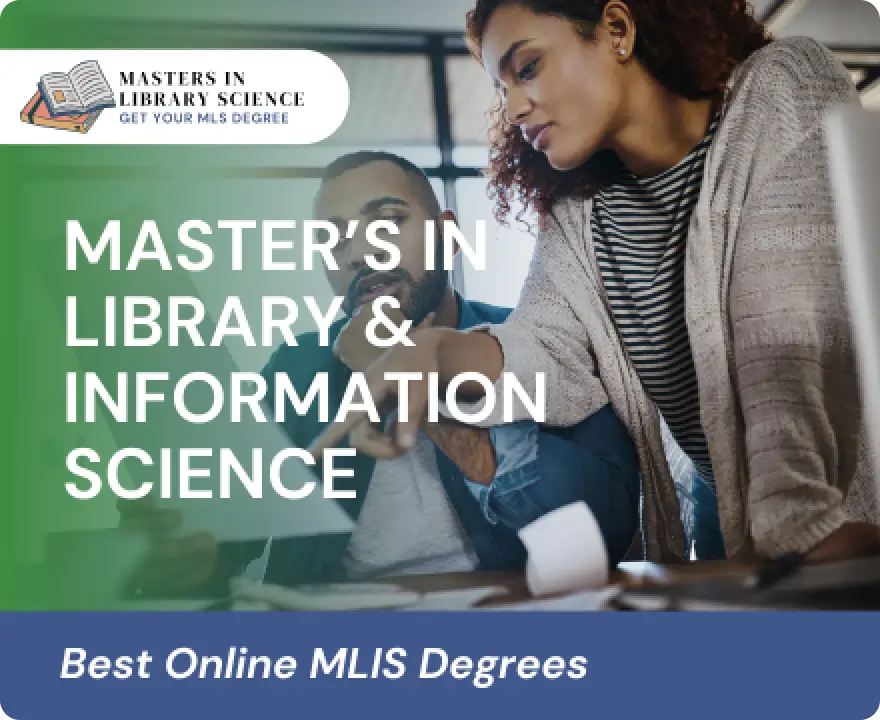Best Master's in Library & Information Science MLIS Programs Online 2025
Find the best online MLIS program for your schedule and career goals
Best Online MLIS Degree Programs
Pursuing a Master’s in Library & Information Science (MLIS) online offers unparalleled flexibility for aspiring librarians and information professionals. As we move into 2025, accredited programs are incorporating cutting-edge technologies and diverse specializations to prepare graduates for evolving roles in library science, archives, digital curation, and more. Online MLIS programs combine academic rigor with convenience, making them an ideal choice for working professionals and full-time students alike.
The best online MLIS programs are those that offer a balance of quality education, accreditation, and accessibility. These programs are accredited by the American Library Association (ALA), ensuring that graduates meet the highest professional standards. Key features of top programs include:
- A wide range of specializations, from public librarianship to digital libraries and archival studies.
- Flexible course schedules designed for working professionals.
- Opportunities for hands-on experience through virtual internships or local placements.
Online Admissions Requirements for MLIS Degree Programs
Admissions requirements for online MLIS programs vary but generally include a mix of academic and professional qualifications. Below is a comprehensive list of common requirements:
- Bachelor’s Degree: A degree from an accredited institution in any field of study.
- Minimum GPA: Many programs require a minimum undergraduate GPA, often 3.0 or higher.
Statement of Purpose: A written essay explaining your interest in library science, career goals, and reasons for choosing the program. - Letters of Recommendation: Typically 2-3 letters from professors, employers, or colleagues familiar with your academic or professional background.
- Resume or CV: Detailing relevant work experience, internships, or volunteer activities in libraries or related fields.
- Standardized Tests (Optional): Many programs have eliminated the GRE requirement, but some may still consider scores as part of the application. Learn more about No-GRE Degree Programs.
- Prerequisite Courses: Some programs may require foundational courses in information technology or research methods if your undergraduate background isn’t related to library science.
- Application Fee: Ranges from $50–$100, though fee waivers may be available.
Ensure you check specific requirements for the program you’re applying to, as these details can vary significantly between schools.
Online Master's in Library & Information Science Curriculum
The curriculum for online MLIS programs is designed to prepare students for a wide range of roles in librarianship, information science, and digital resource management. Programs typically require 36–42 credit hours, which can be completed in 1–3 years, depending on the pace of study. Many programs include a capstone project or internship requirement, allowing students to apply their skills in real-world settings.
Core Curriculum
Core courses cover foundational knowledge and essential skills for all MLIS students.
- Information Organization and Metadata
- Library and Information Services
- Research Methods in Library Science
- Foundations of Digital Libraries
- Ethics in Information Science
Specialized Electives
Students can tailor their degree with electives aligned with their career goals.
- Archival Studies and Digital Preservation
- Public Library Management
- Legal Information Resources
- Academic Librarianship and Teaching Methods
- Information Literacy Instruction
Internship Requirements
Most online programs offer or require internships, either virtually or at a local library, archive, or information center. These internships provide hands-on experience and networking opportunities in your chosen field.

MLIS Degree Specializations
Master’s in Library and Information Science (MLIS) programs offer a variety of specializations tailored to the diverse roles within the library and information science field. Below is a comprehensive look at some of the most popular MLIS specializations, their unique focus areas, and career opportunities.
Children & Youth Services MLIS Degree
This specialization prepares graduates to work with children and young adults in libraries, schools, and community organizations. The focus is on fostering literacy, promoting a love for reading, and developing programs tailored to younger audiences.
- Career Opportunities:
- Children’s Librarian in public or school libraries
- Young Adult Services Librarian
- Literacy Program Coordinator
- Ideal For: Professionals passionate about working with youth, promoting literacy, and creating engaging educational experiences.
Cultural Heritage Information Management MLIS
This specialization is designed for individuals interested in preserving cultural artifacts, historical documents, and other significant heritage materials.
- Career Opportunities:
- Cultural Heritage Librarian
- Museum Archivist
- Historical Collection Manager
- Digital Curator
- Ideal For: Students with a passion for history, cultural preservation, and working in museums or heritage organizations.
Digital Library Science MLIS Degree
As libraries become increasingly digital, this specialization focuses on managing digital collections, online databases, and electronic resources.
- Career Opportunities:
- Digital Librarian
- Web Content Manager
- Digital Collections Specialist
- Technology Librarian
- Ideal For: Individuals interested in the intersection of technology and information science.
Law Librarianship MLIS Degree
This specialization focuses on supporting legal professionals by managing and curating legal research materials, databases, and reference services.
- Career Opportunities:
- Law Librarian in firms, courts, or government agencies
- Legal Research Analyst
- Compliance Information Specialist
- Ideal For: Students with an interest in law, research, and providing critical information services to legal professionals.
School Librarianship MLIS Degree
This specialization equips graduates to work in K-12 schools, supporting educators and students by fostering literacy, teaching research skills, and integrating technology into the classroom.
- Career Opportunities:
- School Librarian or Media Specialist
- Literacy Specialist
- Technology Integration Coordinator
- Ideal For: Professionals who want to combine a passion for education with a focus on library science.
Records Management MLIS Degree
This specialization emphasizes the organization, maintenance, and retrieval of records and information within corporate, governmental, and nonprofit organizations.
- Career Opportunities:
- Records Manager
- Compliance Officer
- Information Governance Specialist
- Corporate Archivist
- Ideal For: Students interested in managing data and records for organizations, ensuring compliance, and maintaining operational efficiency.
These MLIS degree specializations provide tailored pathways to align with specific career goals. Whether you’re passionate about working with youth, managing digital collections, or preserving cultural artifacts, there’s an MLIS program designed for you.
What’s the Difference Between an MLIS and MLS?
The Master’s in Library and Information Science (MLIS) and Master’s in Library Science (MLS) degrees are closely related, but they differ in focus and scope. These differences can help guide your decision based on your career aspirations and interests in the library and information science field. Both degrees are widely respected, but the distinction lies in how each prepares students for traditional and evolving roles in librarianship and information management.
An MLS degree typically centers on the core functions of traditional libraries. Students learn essential skills like cataloging, collection management, reference services, and literacy development. This degree is an excellent fit for those who envision themselves working in public, school, or academic libraries, where foundational library skills are crucial. MLS programs emphasize the operational and service-oriented aspects of library work, equipping graduates to meet the needs of their communities through resource management and educational programming.
In contrast, an MLIS degree incorporates traditional library science coursework with a broader emphasis on information science and emerging technologies. These programs delve into topics such as digital libraries, data management, information governance, and user experience. The MLIS is ideal for individuals seeking careers that extend beyond traditional library settings, such as roles in corporate environments, healthcare systems, government agencies, and tech-driven fields. This degree reflects the evolving nature of the profession, combining traditional skills with modern competencies to prepare graduates for dynamic roles.
Choosing between an MLS and an MLIS depends largely on your career goals. If you’re drawn to traditional library roles and want to work directly with patrons in public or school libraries, an MLS might be the best fit. If your interests lie in digital innovation, data science, or specialized fields like corporate or legal librarianship, an MLIS offers a broader range of opportunities. Both degrees open doors to rewarding careers, but understanding the distinctions can help you make the best choice for your future.

